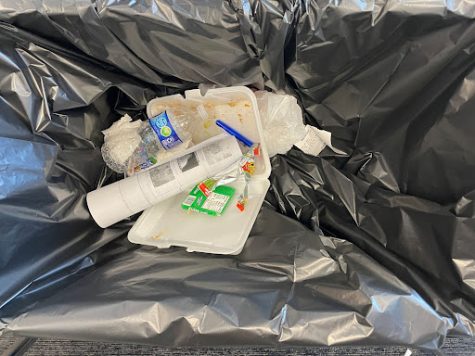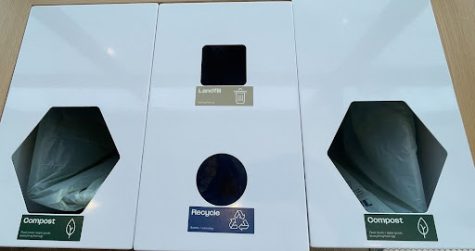TRASHED: The lack of effective recycling programs at Mundelein High School

This dumpster contains solely paper products for recycling.
May 12, 2023
With a flick of a hand an orange peel is thrown into a black bin. Following the orange peel comes a gum wrapper, an empty starbucks cup and an apple core. This black bin is not, in fact, meant for trash, but for recycling.
Students and staff may think that they are doing their part to better the environment when they place their empty plastic cup into the recycling bin; however, they are contaminating the recycling itself by doing this, for the school does not recycle plastics, nor do they recycle any materials other than paper.
Currently, MHS has one dumpster for trash and one dumpster for paper products, both located near the tennis courts. In addition, each classroom has a recycling bin and a trash can typically near the door of the classroom.
Kevin Quinn, Director of Facilities, explained how each night custodians dump the contents from the recycling bins into the recycling dumpster. However, if there are metals, plastics, or anything other than paper in these bins, the custodians will dump the recycling bin contents in the trash dumpster. Quinn noted that it is not the custodians’ responsibility to sort through the recycling. According to Quinn, a Recycling Club at MHS used to sort through these bins, separating the materials into their proper places. However, the club no longer exists.
Quinn further explained how when a recycling bin is contaminated with anything but paper, the recycling center that picks up the dumpster charges Mundelein High School a fee of $250.
“That could be as simple as the driver [seeing] one pop can. Then, the whole thing has to go to a separate sorting facility,” Quinn said. “So if we think about that in simple terms, if one student each day threw a pop in a recycling bin and it contaminated that dumpster, it sets off a whole chain of events.”
Quinn said that in order to improve the situation “we at some point have to decide as a society that we’re gonna prioritize what we’re doing to our environment.”
Caroline Gully, Environmental Club supervisor, stressed the importance of recycling and how there needs to be a change regarding recycling practices at the school. The Environmental Club works to educate students. The club hosts various events and guest speakers. However, the Environmental Club has yet to approach the recycling issue at the school.
Gully described how one of her motivations to recycle comes from where she lives.
“I actually live in a neighborhood where I have a view from my window where I can see the Countryside Landfill. Every day out of the corner of my eye, I can see the trash building up, and it’s a daily reminder for how I can avoid filling this landfill.”
However, many students do not have this constant reminder of Mundelein’s waste. Therefore, numerous students disregard the issue. Quinn agreed with Gully that since many students cannot see the direct effects of the waste piling up, they do not often think about the issue.
Nonetheless, Gully admitted that it would be unrealistic to suddenly change the school’s recycling program.
“It is unfortunate that things like plastics and metals would then go into the garbage, but it sounds like they are going into the garbage anyways. At the very least we could do a solid job of recycling paper and cardboard products, and that would be a great start. All it would require is a little knowledge and change in student behavior.”
Gully added, “I think it would be great for our environmental club to tackle these things one thing at a time. It would be a great thing to have even just a poster above a recycling bin to say what can or can’t go in there as a reminder for a kid who may be about to spit their gum into the recycling bin. Maybe the visual would be helpful.”
Junior Olivia Baude, a member of the Environmental Club, is one of the few students who is aware that so many materials are thrown in the trash instead of recycling.
“It is frustrating considering that our school produces so much waste,” Baude said. “We’re really missing an opportunity to create some change and make our corner of the world a little bit greener.”
According to Baude, “Students don’t correctly recycle at MHS. This is in part due to the lack of information about what is and isn’t recyclable. For example, plastic straws and plastic bags are not [recyclable] because the plastic is too thin. The other aspect of the lack of student [efforts] in recycling can be chalked up to the fact that many students rightly believe that MHS doesn’t have a full recycling program in place. If the school doesn’t care about recycling, why should they?”
In other words, there is a misconception that the school does not recycle, but in reality, the school just doesn’t recycle all materials.
“Most of our students are concerned with environmental issues,” Gully said. “Students see and hear about the problems, but what I see in a lot of our students is a sense of hopelessness. They feel overwhelmed by the severity of the issue, and they don’t know how to take action. [Recycling] is a small step but an important one because we are the most wasteful country in the world. So if we can change some of our habits, the impact is much greater than what you think.”
Baude explained how MHS can take its first step towards reducing the school’s waste by having a recycling program in place that includes glass, metals and plastic.
“This type of shift in the way we recycle would create a change in the amount of waste the school produces, which is considerable. It would also educate students as to the right way to recycle. Hopefully, this would embolden the student body to be more mindful of the amount of waste they produce and how they’re disposing of it,” said Baude.
Spanish teacher Samantha Fehrman said that she often sees students throwing materials into the recycling bin that do not belong there. She also added that she would be happy to have one, if not more bins for separating recyclable materials.
With a system that accounts for recycling all materials, students and staff could reduce the amount of the waste they produce as much as possible.
“Every human being is responsible for about five pounds of garbage a day, and in their lifetime that comes out to be about 45 tons of garbage,” Quinn said. “A car is about a ton and a half. So if we think about weight and scope of what that is, it’s significant.”

